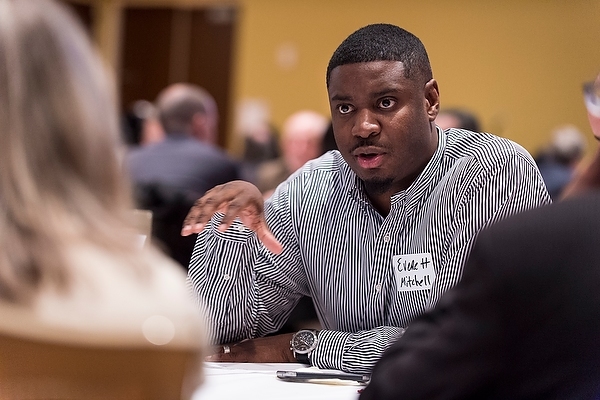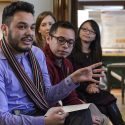South Madison Partnership opens for business

Everett Mitchell, director of Community Relations for the University of Wisconsin–Madison, speaks at a campus forum.
The whiteboards aren’t up yet and the signs that identify the narrow storefront as a part of the University of Wisconsin–Madison still need to be hung.
To Everett Mitchell and Julissa Ventura, the presence is all that matters.
The UW South Madison Partnership, as the space is called, is an important new resource for encouraging mutually beneficial relationships between the university and the South Madison community.
An open house will take place on Thursday, Feb. 12, from 5-7 p.m. at the Partnership, located at 2312 S. Park St. in the Villager Mall. Chancellor Rebecca Blank plans to attend, along with community leaders such as the Rev. Alex Gee, of Fountain of Life Church; Percy Brown, Sr., recently retired from the Madison Community Development Authority and a deacon at Mt. Zion Baptist Church; and Michael Koval, Madison’s chief of police.
Mitchell, UW–Madison’s director of Community Relations, has worked with the Morgridge Center for about two and a half years to construct a space reflecting the collaborative spirit between the university and the South Madison community. The space will be used by UW–Madison’s Community-University Exchange (CUE), a service learning program based in the Morgridge Center for Public Service.
In September, Ventura, a CUE Fellow and doctoral student in educational policy studies, began meeting with campus partners and community members to figure out uses for the space. A community advisory board helped focus on the needs that could be met by a UW–Madison presence in South Madison.
“For all the resources the community provides for the university, this is a way for us to start listening and engaging. True partnership looks like giving them something they’ve been asking for.”
Everett Mitchell
Initial goals include bringing together existing UW–Madison collaborations and programming that already take place in South Madison; building, promoting and hosting community-based service learning courses and hosting courses taught by Continuing Studies; and linking community groups with UW–Madison personnel and services.
“I’m hoping that the collaborative presence we facilitate will lead to long-term impacts around college access, knowledge about UW–Madison and helping the community resolve issues,” says Mitchell. “This is a good start toward building that sort of equitable relationship in community space. For all the resources the community provides for the university, this is a way for us to start listening and engaging. True partnership looks like giving them something they’ve been asking for.”
One top request involved the presence of the Office of Admissions. The Partnership plans to host open houses that encourage South Madison youth to see UW–Madison as an achievable goal.
“We’re sharing information on how to prepare, how to apply and more,” Mitchell says. “The young people can continue to find support for making good decisions that will get them closer to that goal.”
The space features a large room with a full audiovisual setup that can hold 35 to 60 people, either at tables or lecture style. A smaller room is available for eight to 20 people.
A back office area will allow more private conversations to take place. One office is reserved for the Law School’s existing Neighborhood Law Clinic, where law students learn to assist community members (particularly those with lower incomes) with a broad range of legal and advocacy services. A rotating office will be usable by various other functions, including office hours for professors teaching in South Madison.
“Last semester, I spent a lot of time talking about what the space would look like,” says Ventura. “This semester, our goal is to get people out there to not just see it but use it for meetings or classes.”
By the time of the open house, the Partnership will have a website available with descriptions of its resources and a reservation form. Ventura and Mitchell have many ideas for the future, but plan to move slowly and deliberately, reaffirming existing relationships and cultivating new ones in a way that encourages a lasting presence.
“All of the energy around this space began with my conversation with Percy Brown, Sr., and seeing his excitement at the possibilities,” says Mitchell. “It made me realize that there’s value in UW being in community space. Like Dr. Martin Luther King said, ‘It’s always the right time to do what’s right.’”
Subscribe to Wisconsin Ideas
Want more stories of the Wisconsin Idea in action? Sign-up for our monthly e-newsletter highlighting how Badgers are taking their education and research beyond the boundaries of the classroom to improve lives.
Tags: diversity, outreach, The Wisconsin Idea

